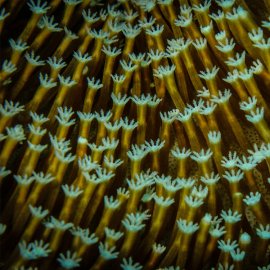Knowing and Doing: The Knowledge-Implementation Gap in Conservation Science
-
English
-
ListenPause
[intro music]
Welcome to World Ocean Radio…
I’m Peter Neill, Director of the World Ocean Observatory.
In a recent post on Medium (March 11, 2022) Juan Anomalocaris offered observations entitled “The Knowledge-Implementation Gap in Conservation Science: Exploring the Space Between ‘Knowing’ and ‘Doing.’ His remarks speak to what may be the most crucial problem faced by ocean scientists and policy leaders, explain why there is such limited implementation and action in ocean conservation, and suggest how the situation might be improved by the abandonment of conventional structure in favor of new behaviors, collaboration, and public engagement.
We are inundated by data, scientists diving deeper and deeper into the complex process of ocean systems and origins and actions of ocean creatures. Equally prolific, the policy analyses and reports of institutes and international organizations provide comparable detail and understanding of regulatory and legal structures, treaty opportunities, and national and regional schemes for management and capacity training. My shelves and email are filled daily with such important work; I share and post the conclusions and recommendations. But I fear that this work is read or heard primarily by the authors’ peers and fellow practitioners whose brief does not include implementation, the transformation of knowledge to use.
I do not mean to disrespect this work; we need “pure science,” depending on deduction from demonstrated truths. But we also need the knowledge studied with regard to practical applications by which to solve the evident, critical problems of ocean conservation. But the system is flawed by a basic disconnect between how the research is performed and interpreted, how the scientists are rewarded by further grants and peer reviews, how the results are communicated, by whom, to whom, and in what format to be shared effectively with those who are responsible for the governance and management of the ocean resources, the adaptation to actual behavioral change and solutions, and the application of the information to real-world questions and answers.
What might we change? First, the grantors who support research might add to their requirements some intended relation of the results to practical needs. Investigations might be incentivized in the direction of the most urgent challenges. Second, a broader scope of disciplines might be suggested as means to bring more diverse perspective to the definition of the inquiry, the methodology to be followed, and the expectations for utility of outcomes. Third, multi-disciplinary teams and approaches might be encouraged. Fourth, reward and recognition for success might not be limited to distinguished reputation, academic journals, and similar institutional formats. Proposals might be offered not just by certain scientists and their host institutions, but perhaps in partnership with government agencies and non-profit organizations with mission-driven obligation to apply outcomes to most urgent needs. Fifth, programs might also be asked to entail and design communications and applications specifically for applied use. A required public engagement element might be required, from the beginning, as part of an educational and communications strategy for college and secondary school use and distribution to an audience wider than the conventional circle of similar, narrow scientific expertise.
Will things change? The behaviors and formats are so institutionalized, the rewards so exclusively focused, the disciplines so fixed and concretized, and the communications, indeed the very language of the reports and announcements so inaccessible and incomprehensible to the public, that change has been hard to come by.
There is, however, that old adage that explains and directs so many things: Follow the Money, the harsh but effective impact of investment directed one way, not another. Science sets its own agenda. Science lives mostly on public money. But that public has very specific needs. Government can direct research toward the most pressing areas of questions and answers, problems and solutions. We see it all the time. Subsidy for fishing vessel construction creates a large, aggressive, efficient fleet and catch increases beyond renewal, with wasted bycatch, market saturation, and depletion of the most popular species. Grants for alternative technology begets wind, solar, and other sources of energy production that confront the conventional polluting systems but, in spite of resistance and fear, force investment and adoption of new technologies. The inadequacies of the energy distribution grid lead to battery research, new storage systems, and high efficiency replacement. Private capital, seeing opportunity for the future, looks ahead to new fuels derived from hydrogen, ammonia, algae, and even ocean water itself. All this is the result of scientific research and development responsive to a public need, envisioned, guided, communicated, and applied as connection between what we know, what we discover, and what works best. This science, perhaps less pure, must not fail us.
We will discuss these issues, and more, in future editions of World Ocean Radio.
[outro music]
This week we're referencing a recent Medium post entitled "The Knowledge-Implementation Gap in Conservation Science: Exploring the Space Between Knowing and Doing" which speaks to what may be the most crucial problem faced by ocean scientists and policy leaders, and offers suggestions for how the situation might be improved by new behaviors, collaboration, and public engagement.
About World Ocean Radio
Peter Neill, Director of the World Ocean Observatory and host of World Ocean Radio, provides coverage of a broad spectrum of ocean issues from science and education to advocacy and exemplary projects. World Ocean Radio, a project of the World Ocean Observatory, is a weekly series of five-minute audio essays available for syndicated use at no cost by college and community radio stations worldwide.
World Ocean Radio is produced in association with WERU-FM in Blue Hill, Maine and is distributed worldwide by the Public Radio Exchange and the Pacifica Network.
Available for podcast download wherever you listen to your favorites.
Image
Benjamin L. Jones on Unsplash
@boardshortsben
Resources
- Juan Anomalocaris, “The Knowledge-Implementation Gap in Conservation Science: Exploring the Space Between Knowing and Doing
- Login to post comments



